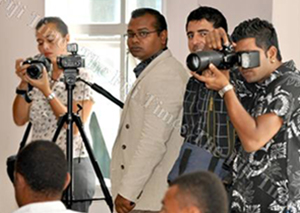
Samuel Berenyi
SUVA (The Fiji Times/Pacific Media Watch): Fiji has the most extreme cases of limitations on freedom of speech, says a recent regional report commissioned by the Pacific Media Assistance Scheme (PACMAS).
The 2013 State of Media and Communication report showed that out of the 14 Pacific countries surveyed, Fiji had the poorest record on freedom of speech.
In comparison to the Fiji media, journalists in Papua New Guinea were usually free to report, with only occasional reported pressure from the government and big business to censor stories.
In terms of Freedom of Information (FOI) legislation, the first and only country in the Pacific so far, according to the report, to introduce the FOI has been the Cook Islands.
Implementation has, however, been problematic and journalists face ongoing barriers to government information.
Papua New Guinea and Solomon Islands have FOI provisions in the constitution and other Pacific countries are in dialogue with advisory agencies regarding FOI legislation.
These countries include Vanuatu, Tonga and Palau. Fiji was not listed.
The report said tradition and culture were significant factors in journalism across the Pacific, impacting media freedom, and that scholars and practitioners had engaged in conversations seeking to define the "Pacific way" of doing journalism.
The report also said a professional interviewed for the survey suggested that "when a crisis erupts caused by a journalist doing his/her job rather well, governments tend to selectively invoke 'tradition' or 'the Pacific way' to criticise, even silence the media".
An example of this, outlined by the report, was when the government pressured and then banned a non-government newspaper in Tonga.
Tonga moved from "partly free" to "free" press in the freedom rating during 2012, due to improved civil liberties.
As the mainstream media was limited in its capacity to report, especially in Fiji, online media may be providing a way to critique the political regime, especially in light of the upcoming election, the report said.
Yet there were concerns in regard to information quality if people turned to blogs and social media.
"There are serious concerns about the quality of information and consequences of postings as people turn to blogs and social media for information," the report said.
In regards to journalism in the Pacific, Professor David Robie (2008, as quoted from the report), director of the Pacific Media Centre, discussed the idea of development journalism.
PMW reports: David Robie's critical development journalism and other media methodologies are more fully debated in a new book due for publication late next month, Pacific Media, Mayhem and Human Rights.
The PACMAS State of Media and Communication Report
This work is licensed under a Creative Commons Attribution-NonCommercial 3.0 New Zealand Licence.




